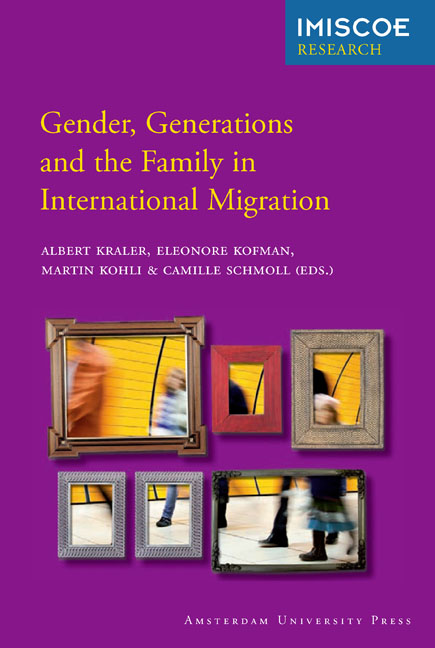Book contents
- Frontmatter
- Contents
- Preface
- 1 Introduction: Issues and Debates on Family-Related Migration and the Migrant Family: A European Perspective
- Section I The Family as a Moral and Social Order
- Section II Gender, Generation and Work in the Migrant Family
- Section III Marriage Migration and Gender Relations
- Section IV Transnational Family Lives and Practices
- List of Contributors
- Index
- Other IMISCOE titles
15 - Negotiating Transnational Caring Practices Among Migrant Families
Published online by Cambridge University Press: 21 January 2021
- Frontmatter
- Contents
- Preface
- 1 Introduction: Issues and Debates on Family-Related Migration and the Migrant Family: A European Perspective
- Section I The Family as a Moral and Social Order
- Section II Gender, Generation and Work in the Migrant Family
- Section III Marriage Migration and Gender Relations
- Section IV Transnational Family Lives and Practices
- List of Contributors
- Index
- Other IMISCOE titles
Summary
Introduction
Currently, there is increased political and academic interest in family migration and migrant families. This has led to theorisations of ‘transnational living’ that tend to assume that transnationalism has been made easy by advances in modern travel and digital communications. More recent studies are now exploring how and to what extent members of migrant families negotiate their long-distance relations and caring practices (Ryan, 2007; Zontini, 2006, 2007; Evergeti, 2006, 2008; Baldassar & Baldock 2000; Baldassar, 2007; Banfi & Boccagni this volume). Our aim in this chapter is to conduct a brief yet critical exploration of the relevant literature, highlight the complexities and changing character of transnational family links and explore how they are negotiated and managed through time and space and with the changing circumstances of migrants and their families ‘here and there’.
In the first part of the chapter we give a short but critical examination of the term ‘transnationalism’, highlighting the importance of migrants’ agency and family interactions in understanding how long-distance family relations work in practice. Often this field is theoretically driven, though recent empirical studies have shown that transnational caring practices are diverse and depend on the changing circumstances and living arrangements of migrants and their families. Our discussion explores some practices of transnational or long-distance caring through empirical examples from our own work and other relevant literature.
Recent increases in the migration of domestic workers and paid carers, and the ways in which women are involved in transnational caring, have led to the development of what has been called the ‘global chains of care’ paradigm. This theoretical model seeks to explain the phenomenon of domestic workers in terms of social disadvantages and power inequalities where Western women employ socially disadvantaged migrant women as nannies and maids who, in turn, leave a ‘caring vacuum’ back in their countries of origin. This concept could provide some interesting insights into the caring roles of domestic workers. However, as we will show in our discussion, it fails to capture the diversity and changing nature of caring responsibilities of migrants (whether domestic workers or not) and the complex web of interactions that support and maintain transnational family links.
- Type
- Chapter
- Information
- Gender, Generations and the Family in International Migration , pp. 355 - 373Publisher: Amsterdam University PressPrint publication year: 2012



